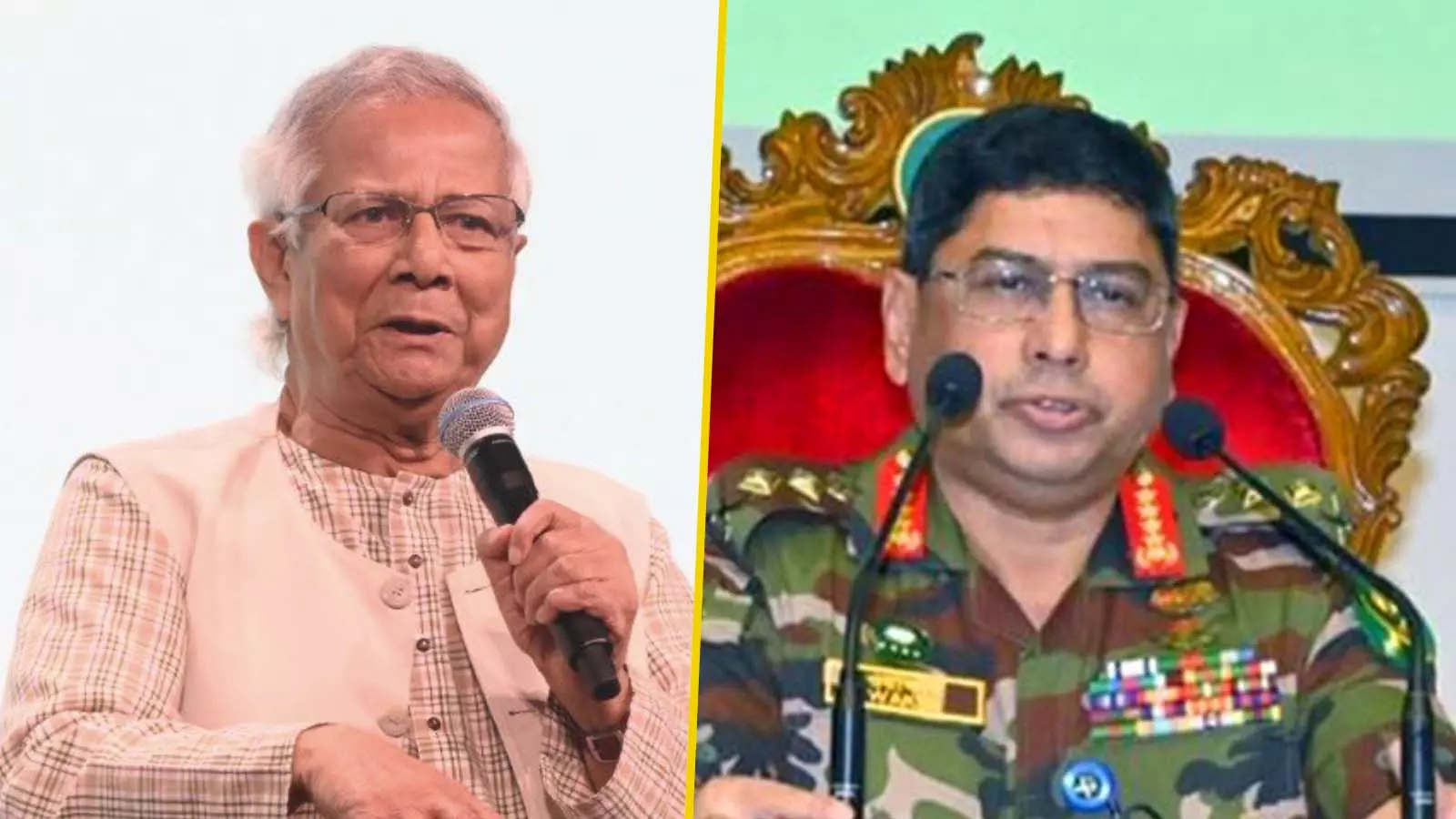
Showdown imminent between Bangladesh's Yunus regime and army
Situation heats up after International Crimes Tribunal issues arrest warrants against 24 army officers for alleged enforced disappearances, secret detentions, torture

The Bangladesh Army, which put in place the country’s interim government after the ouster of Sheikh Hasina’s government in August last year, is now heading for a showdown with the current Muhammad Yunus regime.
This became imminent after the country's International Crimes Tribunal (ICT) issued arrest warrants against 24 army officers for their alleged involvement in enforced disappearances, secret detentions, and torture.
“The move has caused serious unrest and division within the Bangladesh Army,” said a serving officer of the country's domestic intelligence agency NSI (National Security Intelligence).
Also read: What’s behind Yunus’ anti-India tirade? Fear of Awami revival, power goals
“Army Chief General Waker-uz-Zaman is under intense pressure from within the force.”
In fact, General Zaman has cancelled his visits to India and Saudi Arabia this month amid mounting tensions.
Tribunal backfires on Hasina
The tribunal, a creation of the Hasina government to try those who committed war crimes during the 1971 Liberation War, is now being used by the Yunus-led interim government to frame and prosecute all seen as close to the Hasina regime and allegedly responsible for crimes like enforced disappearances and extra-judicial killings.
The chief prosecutor of the ICT — Tajul Islam — who earlier served as the defence counsel of leaders of Jamaat-e-Islami in the same tribunal, is now pursuing the Jamaat's agenda to avenge the hangings of some of its leaders for 1971 war crimes.
Also read: Outrage in Bangladesh as late ex-minister Humayun seen handcuffed in hospital
Scores of politicians and other officials, including Hasina and her former home minister Asaduzzaman Khan Kamal, have already been implicated by the tribunal. But this is the first time it has moved against army officers.
Of the 24 personnel named, 15 are already in military custody, while nine are retired. One officer, Major General Kabir Ahmed, has gone missing from his cantonment residence.
A meeting among the army officers on October 9 reportedly became highly heated over the issue. Most military personnel argued that those officers found guilty of serious crimes should be tried under the 1952 Army Act in military courts.
Also read: Yunus says Bangladesh has problems with India over hosting Hasina
“How can you drag a military officer, including serving generals, to a civil court in prison vans?” wondered a retired lieutenant general. “There will be no honour left for us anymore.”
Gen Waker-u-Zaman's dilemma
Army chief Gen Waker-u-Zaman is caught between a rock and a hard place.
If he fails to prevent the accused officers from being dragged in prison vans, he risks the wrath of his subordinates, some of whom now openly accuse him of being too soft on Yunus and his cohorts despite serious differences.
On the other hand, if he moves strongly to force Yunus and the ICT chief prosecutor to concede trial in military courts and they refuse, he is left with no option but to go for a military takeover by getting the president to declare an Emergency. That is what many of his subordinates have long advised him to do to arrest the sharp decline in law and order marked by increasing mob violence.
Also read: When Mujibur Rahman was branded India’s agent
But General Waker-uz-Zaman has avoided the hard option because he thinks the army’s cause is best served if it remains a professional force and avoids taking political control, like in Pakistan.
So far, he has pushed Yunus to announce the parliamentary election soonest possible so that the army can go back to the barracks, leaving power to an elected government.
But the interim government’s chief adviser has tried delaying the polls on the grounds that reforms and trials (of Hasina's people) were more important than polls. Thousands have been framed, many on blatantly false charges.
'Yunus destroyed police'
“Yunus has destroyed the police by framing and sacking those in responsible positions during Hasina's government and replacing them with those close to Islamist groups. Now he is trying to do the same in the army,” said a lieutenant general who has fled the country.
Also read: How Bangladesh’s provocative military strategy fuelled unrest in its hill tracts
Former Brigadier Abdullahil Aman Azmi, son of former Jamaat-e-Islami Ameer Ghulam Azam, is said to be actively mobilising a faction of officers to oust those considered close to Hasina. Azmi is close to Pakistan, which looks to use Bangladesh as the second front for its proxy war against India. Recently, Jamaat leaders threatened mobilisation of millions for a holy war against India.
Dismissed in 2009 and reinstated in December 2024, Azmi is currently keen to punish officers close to Hasina and get the “Islamist types” in command-and-control positions. Some say he is also gunning for the removal of Waker-uz-Zaman as the army chief and putting a pro-Pakistan officer in his place.
Also read: Will Bangladesh's pro-Islam foreign policy change after 2026 polls?
A new Jamaat-affiliated platform of retired officers named Retired Armed Forces Rights Council Bangladesh recently held a conference led by Lt. Gen. (Retd) Aminul Karim. On the same day, another meeting was held separately under Major General (Retd) Azizur Rahman, president of the Armed Forces Retired Personnel Association.
These are moves to take the army on the path of radicalisation on the Pakistan model.
Insiders say the army is divided down the middle, which may explain Waker-uz-Zaman’s reluctance to avoid a showdown, which, however, seems inevitable.

